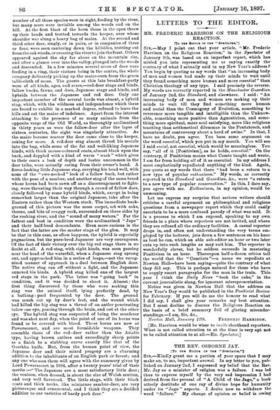LETTERS TO THE EDITOR.
MR. FREDERIC HARRISON ON THE RELIGIOUS REACTION.
2112 EDITOR Of TEl " firscrAroz.")
SIR,—May I point out that your article, "Mr. Frederic Harrison on the Religious Reaction," in the Spectator of January 9th, was based on an imperfect report, which has misled you into representing me as saying exactly the contrary of what I actually said in my New Year's address You begin by quoting as my words that "an increasing body of men and women had made up their minds to wait until they found something more human and more essential" than Christian theology of any type. I said precisely the reverse. My words are correctly reported in the Manchester Guardian of January 2nd, the Standard, and elsewhere. I said: "An increasing body of men and women are making up their minds to wait till they find something more human and social than the Cosmogony of Evolution, something to reverence more tangible and intelligible than the Unknow- able, something more positive than Agnosticism, and some- thing more spiritual, more soul satisfying, more like religious teaching than arithmetical dilemmas in the Pentateuch, and mountains of controversy about a herd of swine." In that, I have no doubt, you agree. You base some argument on the word essential, which you put in ray mouth. You will see I said social, not essential, which would be meaningless. You say, "all of it [Positivism], as he holds, essential." On the contrary, if Positivism means what Comte taught and wrote,. I am far from holding all of it as essential. In my address I most emphatically repudiated anything of the kind. Again,. you quote as my words that there "bad been a return to a new type of popular enthusiasm." My words, as correctly reported in the Standard and Guardian, &c., were "a return to a new type of popular conservatism." In this, I dare say,. you agree with me. Enthusiasm, in my opinion, would be unmeaning.
Let me express my surprise that serious writers should criticise a careful argument on philosophical and religions questions from a newspaper report which they could easily ascertain to be a mere confused parody of what was said. It is a process to which I am exposed, speaking to my own, friends in a place where reporters are not invited, and where they are refused all the ordinary facilities. A casual reporter- drops in, and often not understanding the very terms em- ployed by the lecturer, jots down a few sentences on his knee as best be can, which an able sub-editor an hour or two later cuts up into such lengths as may suit him. The reporter is wonderfully clever, but he seldom succeeds in mastering Positivism in an hour. Thereupon half-a-dozen critics tell the world that the " Comtists "—a name we repudiate at Newton Hall—have been saying—quite the contrary of what they did say. This is perhaps natural for those who have to supply smart paragraphs for the man in the train. This year I think the Daily News "took the cake," in the current journalistic slang, for ignorant misrepresentation.
Notice was given in Newton Hall that the address on New Year's Day would be published in the Positivist Review, for February. If you will do me the honour to read what I did say, I shall give your remarks my best attention. But I must decline to discuss the Religious Reaction on the basis of a brief summary full of glaring misunder- standings.—I am, Sir, Sze., Newton Hall, January 12th. FREDERIc HARRISON.
[Mr. Harrison would be wiser to invite shorthand reporters.. What is not called attention to at the time is very apt not to be called attention to at all.—En. Spectator.]






































 Previous page
Previous page